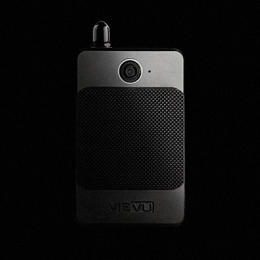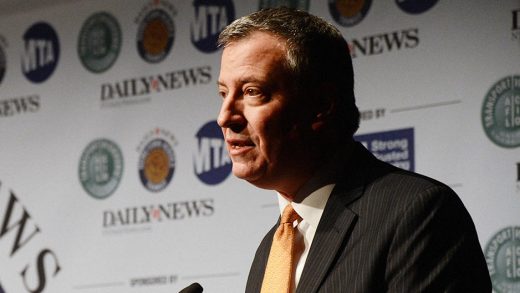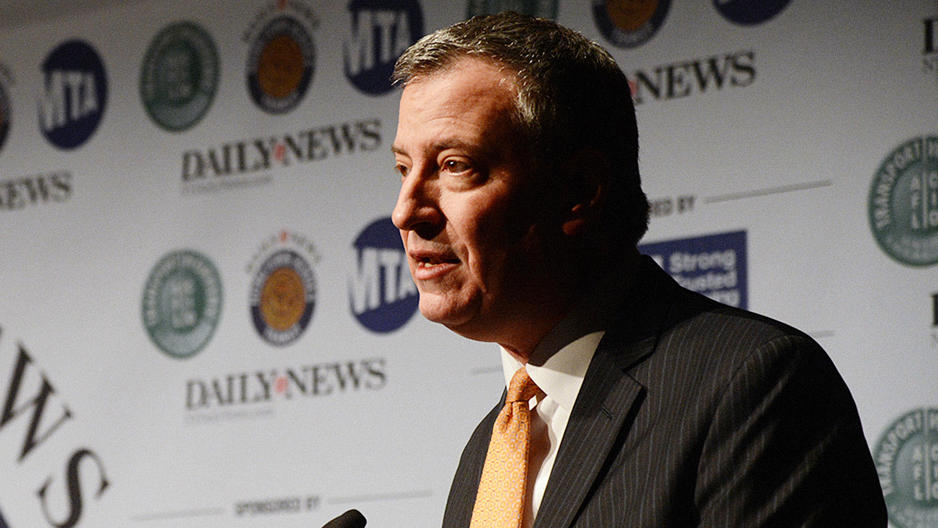NYC Mayor Defends Police Body Camera Buy, Decrying A Competitor’s “Smear” Campaign
The New York Police Department and Mayor Bill de Blasio are proceeding with a body camera contract over objections by the city’s chief financial officer. The decision comes amid concerns about the quality of the cameras, which are made by Seattle-based Vievu, and what the mayor called a behind-the-scenes effort to “denigrate” the company by its main competitor, Taser International.
The mayor made his accusation during a press conference on Monday, the same day that an attorney for the City of Phoenix, Arizona sent a letter to Taser’s CEO reprimanding him over what he called an attempt by the company to “improperly influence” that city to choose Taser’s body cameras.
On Friday, the last day that New York City’s $6.4 million, 5,000-camera contract with Vievu could be approved, the city’s Comptroller Scott Stringer declined to sign off on it, after learning at the last minute about an ongoing investigation by the city’s inspector general. The investigation was initially reported by Wall Street Journal and the New York Times on Friday. But on Monday, defenders of the contract, including NYPD officials and Mayor de Blasio, insisted that all requirements for the city Comptroller’s approval had been met, and that any ongoing investigations did not relate to fraud or corruption.

The decision by the Comptroller—who may challenge de Blasio in the city’s next mayoral race—stemmed from a 2015 Department of Investigation report that highlighted 23 concerns with the purchasing process. The NYPD said it had addressed those concerns. “The fact that the Comptroller did not cite any of the statutory (reasons) . . . or raise an applicable objection, the Contract is deemed registered,” Deputy NYPD Commissioner for Legal Matters Lawrence Byrne wrote in a letter to Comptroller Stringer’s office, according to a DNAInfo report.
Last year, a nine-member panel at the NYPD studied more than 50 proposals from 17 body camera vendors before narrowing the choice down to Vievu’s L4 and Taser’s Axon Body cameras, which scored nearly identical marks on their equipment, as DNAInfo reported. But the companies’ blind bids were far apart, with Taser seeking $17 million compared to Vievu’s $6.4 million.
A Lobbying Battle, With “Free” Cameras
The debate has drawn attention to concerns about the use and reliability of cameras, and the comparative advantages between different models. But the controversy also highlights the costs of the cameras, and the intense behind-the-scenes battle among police manufacturers for a slice of a lucrative market. Scottsdale, Arizona-based Taser, known for its eponymous electroshock weapons, is now considered the body camera industry leader, with contracts at 35 city departments, it says, with a market capitalization of $1.4 billion. Vievu, which is a subsidiary of Florida-based, privately held police supplier Safariland, commands a smaller portion of the market, with notable contracts in Oakland and Aurora, Illinois.
After the NYPD contract was awarded in October, Taser, whose stock dropped 14% on the news, mobilized a pricey lobbying effort to derail the deal. It has claimed that Vievu was selling its cameras and a year of online storage “near or below cost.” Vievu has said it has a leaner business model—it doesn’t have the robust software division that Taser does—which allows it to pass those savings to customers.
Taser launched a complaint with the police commissioner, citing field test reports from the Los Angeles Police Department and three other police agencies that chose Taser’s cameras over Vievu’s. In one report cited by Taser, the Cincinatti police department compared Vievu’s and Taser’s cameras and found that Vievu’s to be lacking in field of view, low-light performance, battery life, and storage software.
In October, Taser also quietly hired a top political consultant at a price of $15,000 a month, and waged what appeared to be a coordinated PR campaign against Vievu. As part of the effort, Politico reported, a group of Harlem pastors raised questions about the quality of Vievu cameras, while a city councilmember gave interviews to a number of local publications, including the New York Post and the New York Observer, in which he raised concerns about Vievu.
Vievu has also hired lobbyists to make its case to the city. In June, the company signed its first New York State lobbying contract, a $15,000-per-month agreement, to retain Freddy Ferrer, the well-known former Bronx Borough president and two-time mayoral candidate, as an advocate for the company.
At a press conference on Monday, Mayor de Blasio praised the NYPD’s record on technology and fired back at critics, saying “a lot of information has been put out to try and denigrate” Vievu. “I don’t think it’s the first time in the history of the free enterprise system that we’ve seen one company try to smear another,” he said. “But the NYPD is very, very careful in how it makes its technology choices.”
Steve Tuttle, a Taser vice president, sent Fast Company documentation of five cities where Vievu cameras had been discontinued amid concerns over quality, and two cities where the cameras had received low evaluation scores. “Contrary to Mayor De Blasio’s accusations, we simply let the public record about our competitor’s performance speak for itself,” he wrote. “We compete all around the world against other body camera companies and each has to stand on their own merits or limitations. It is critically important to law enforcement agencies and their communities that their body camera programs are successful, and that the evidence generated is secure and reliable.”
A spokeswoman for Vievu, Aura Reinhard, said, “The City of New York and the NYPD conducted an exhaustive request-for-proposal process, evaluating more than 50 companies, and determined that Vievu is superior—with respect to both technology and pricing. We believe our competitor is now attempting to spread false and misleading information about a fair and public process because they lost.”
The campaign by Taser against the NYPD contract is part of a pattern of aggressive and sometimes uncompetitive efforts aimed at capturing body camera contracts, the company’s competitors have alleged.
Two weeks after the camera contract was awarded, for instance, the company offered the NYPD 1,000 cameras for field testing “as a gift to the city of New York.” A Vievu representative responded with a similar offer but the company later rescinded it. The police department declined both offers.
Last month, as the City of Phoenix was preparing to end a body camera contract with Vievu and readying a new request for proposals to meet recent advances in technology, Taser also made an offer of “free” cameras to the city’s police department. In a letter sent on Monday, obtained by Fast Company, the attorney for the city warned Taser CEO Rick Smith that an offer of “free” cameras during an open solicitation for camera proposals was “clearly out-of-bounds and legally impermissible.” Such an offer, attorney Brad Holm wrote, violates the city’s procurement code, “creates the appearance of ethical impropriety,” and buttresses allegations made in court by Digital Ally, another body camera maker, “that Taser’s pattern of procurement misconduct is anticompetitive and monopolistic.” If Taser “fails to comply with this directive,” the letter warned, “the City will consider debarment proceedings against the company.”
In an email to Fast Company on Thursday, Tuttle, the Taser spokesperson, said “in mid-January we gave all major law enforcement agencies the opportunity to use our products as a free trial for one year, and we encourage our competitors to test alongside our cameras.”
“In contrast to outdated, bureaucratic processes, the best way to evaluate technology is to test solutions, with actual users, at scale,” he wrote. “Many agencies have purchased technology without first testing it, resulting in millions of dollars of lost investment and frustrated officers with unusable technology. When making major investments in technology, an informed buyer is in the public’s best interest.”
In New York, where the city is complying with a 2013 federal court order related to its use of “stop and frisk” techniques, a total of 1,000 officers are slated to wear cameras by the end of the year. By 2020, the city intends to equip all officers with cameras. New York has not yet issued a request for proposals for its next camera purchase, but the contract with Vievu stipulates options to increase the total number of cameras before the end of its five-year term. Under contract renewals, the agreement could last long as 14 years, scale up to as many 18,000 units, and generate revenue of up to a quarter of a billion dollars.
Updated to clarify Vievu’s offer of “free” cameras to the NYPD and to include Taser’s response to the City of Phoenix letter.
Fast Company , Read Full Story
(32)














